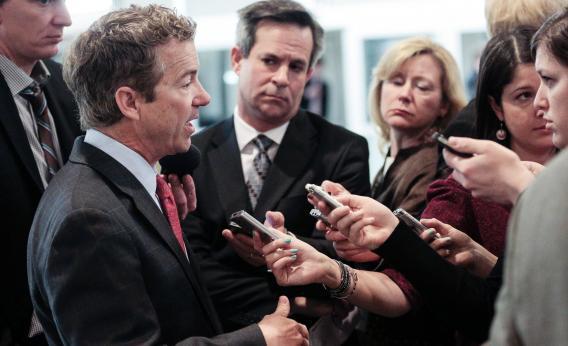Rand Paul tried to do a good deed: A speech praising Latino culture, expressing his openess to immigration reform. But the Associated Press, previewing the speech, said that Paul would offer a “path to citizenship.” Paul and his office said this was simply wrong, and interestingly, the conservative media blocked and tackled for him.
“In the overall context, which I confirmed with the Senator directly,” wrote RedState’s Erick Erickson, “he is talking about fixing the guest worker program, not giving citizenship,” because if you CTRL+F’d his speech, the word wasn’t there.
“It is not clear he favors citizenship at all,” wrote Jennifer Rubin. “The word does not appear in his speech. Instead he favors border security to be certified by an inspector general and then ratified by Congress before moving on to available work visas for those here illegally.”
At 3 p.m., Paul opened up the lines for reporters to grill him on his position. The call had been scheduled all day—it wasn’t an attempt at clean-up. But as beat reporters kept following up on the “path,” Paul gave the word the Encyclopedia Britannica treatment.
“If we get trapped too much in this descriptive terms, whether we’re for or against a path to citizenship, I think what we’re gonna do is polarize the debate,” he said. “Anywhere around the world, you have a path to citizenship.”
The dialogue started obscure and ended obscure, which was inevitable in any discussion of two theoretical approaches to a legal issue. (Neither Paul nor the bipartisan Senate group actually have an immigration bill.) Paul would not give illegal immigrants a special path to citizenship. He would offer “work visas that bring people out of the shadows,” and “If they want to be citizens I’m open as to what we do to move forward.” People could talk this out. “Can’t we have reforms and not call them names that discourage the progress going forward?”
The discussion was unbearably meta: Paul was protesting that “path to citizenship,” like “amnesty” before it, was so loaded that it sent people running from the negotiating table. “A green card is the pathway. Once you have the green card you have five years” to start the citizenship process. Did those people start at the back of the line? Yes, and “I know this sounds silly, but it’s about a lot of lines.”
Paul’s dilemma was obvious. He had a reservoir of trust with conservatives. He did not want to alienate those who immediately put immigration reformers in the “sell-out” column. But when you alert the media to a policy speech, the media’s going to look for a new policy.
